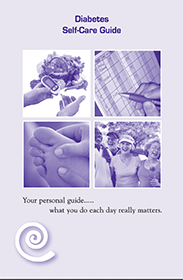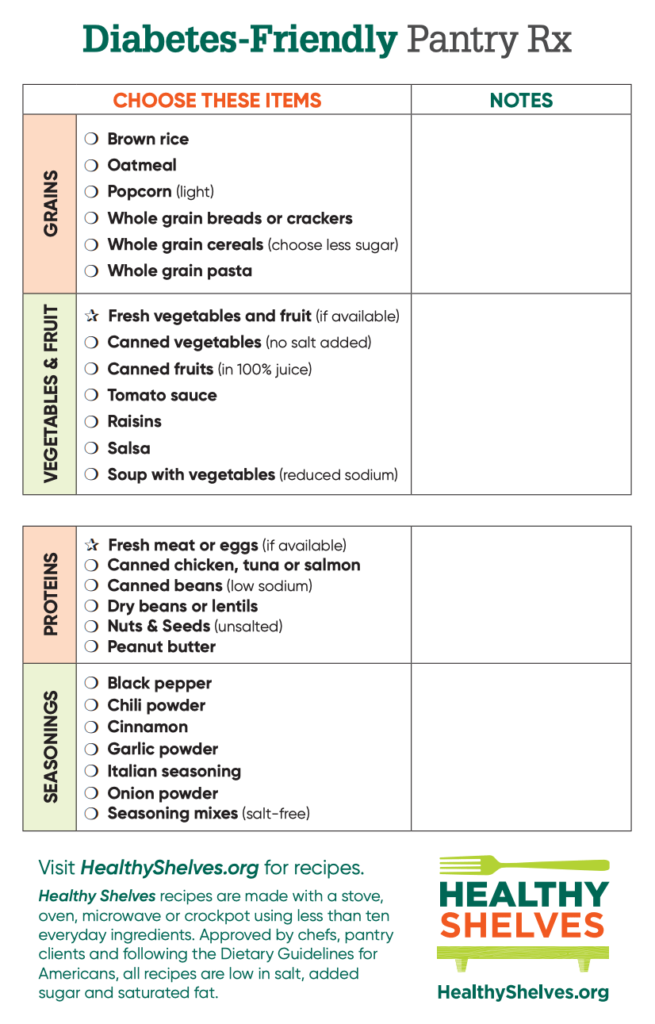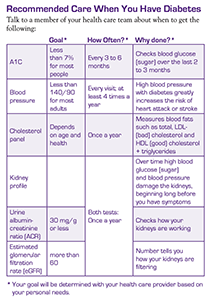Diabetes is a chronic condition that can affect many of the body’s organs including the kidneys which are important filtering units in the body. Over time, these filtering units (nephrons) can become damaged, protein spills into the urine and the kidneys cannot filter the blood the way they are supposed to. Diabetes is the leading cause of kidney disease.
What is Diabetes?

Diabetes is a disease that affects how the body uses the food you eat to make energy. When you eat a meal or snack, the body breaks down that food into usable parts, including glucose (sugar). This glucose enters into the bloodstream and is used to provide the body with energy. In order to be used for energy, the body uses insulin (a hormone) like a key to unlock the body’s cells and let the energy in.
In people with diabetes, there isn’t enough insulin, so the glucose (sugar) isn’t able to get into the body’s cells and builds up in the blood. Too much glucose in the blood can harm the kidneys, heart, eyes and nerves. Diabetes is a disease that will not go away but can be managed and monitored to keep blood sugar levels within safe ranges.
There are two two types of diabetes: Type 1 or Type 2. The most common is Type 2. When a person has Type 2 diabetes, their body makes insulin, but that insulin is not always able to unlock the body’s cells to let blood sugar in. We call that insulin resistance. When a person has Type 1 diabetes, the immune system, the body’s system for fighting infection, attacks and destroys the insulin-producing cells of the pancreas; no insulin the glucose level in the blood gets too high.
Diabetes is diagnosed with a series of blood tests to check blood sugar levels.
People are at risk if they have a family history of diabetes, are overweight or have high blood pressure. African Americans, Latinos, Asian Americans, Native Americans, Native Hawaiians and Pacific Islanders have a higher risk of developing diabetes.
Take an eight question Prediabetes Risk Test to determine if you are at risk and learn more about the evidence-based lifestyle change programs available in your community from the Center for Disease Control and Prevention. No personal information is required to participate.
Living with Diabetes
Diabetes is a common, controllable condition that never goes away once diagnosed. However, it is possible to still “live well” with the condition. No matter what type of diabetes a person has, it is important to know how to manage it.
A Helpful Guide
Download the Diabetes Self-Care Guide for information and tools for a personal guide to managing diabetes. The guide includes recommendations for:
- Monitoring blood glucose (sugar) levels at home
- Physical activity
- Tips for healthy meal choices
- Participating in self-care education
- Knowing what the right numbers are for you
- Proper foot care
- Filling prescriptions
- Taking medication as prescribed
- Making regular health visits
- Quitting tobacco /vaping products
Resources in Your Community Available to Help
A dietitian or Certified Diabetes Educator (CDE) can help make a personalized food/meal plan.
- To find a Diabetes Educator in the community: (800) 338-633
- To find more information about nutrition: (800) 877-1600 or EatRight.org or MyPlate.gov
HealthyShelves.org
The National Kidney Foundation of Wisconsin has partnered with Healthy Shelves.org to create diabetes-friendly resources including:
Recipes made with only a stove, oven, microwave or crockpot and using less than ten everyday ingredients. Approved by chefs, pantry clients and following the Dietary Guidelines for Americans, all recipes are low in salt, added sugar and saturated fats.
Pantry Rx is a tool to help build healthier shopping suggestions when meeting with a dietitian, Certified Diabetes Educator (CDE) or health care provider.
The Wisconsin Institute for Healthy Aging
The Wisconsin Institute for Healthy Aging has evidence-based programs available to help people at risk of diabetes and for those who have been diagnosed with a chronic condition.
Be an Active Member of Your Health Care Team
You should speak to your health care provider if you have any questions about your health. Make a list of questions, ask the most important questions first and make sure to ask about anything you don’t understand.
THE DIABETES SELF-CARE GUIDE provides a list of how often you should schedule visits with members of your health care team along with a personal care record (page 6) to track dates for labs, exams, immunizations and education. There is also a list of additional local and national resources available in addition to the information in the guide.
You are the most important person on your care team. It is always okay to have and ask your health care provider questions as your needs will change along the way. You can also call the National Kidney Foundation of Wisconsin help line at 414-897-8668 (1-800-543-6393 toll-free) or email info@kidneywi.org. The team is here to help you.
More Information
Additional information about diabetes and other kidney health topics can be accessed from the
National Kidney Foundation’s Topic Brochures page. Click here to be directed to the National
site.








